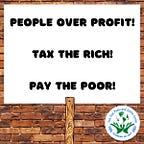Ableism
When a disabled person requests an accommodation, this is not a convenience request from that person. This is about what the person needs to engage equally and equitably. So when this need cannot be met prior to the meeting, communicate that reality. It is simple: Just let that person know the accommodation could not be provided and reschedule the meeting for when the accommodation can be fulfilled. This at least doesn’t set the person up to experience the active oppression that is present in almost every second of our days to start with.
As a collective access practitioner, I understand the struggle of meeting accommodation needs. Even though we are 30 years after the Americans with Disability Act (ADA) was passed, the systems we navigate are filled with structural and institutional ableism that trickles down to everyone (staff, clients, etc). This is probably the only place “trickle down” theory works. When a person’s value is boiled down to the cost of their needs, it is too easy to blame the person for that cost and not see this structural reality impacting their potential for success.
In the most recent situation where my access need was disregarded, it was a zero-cost request but the process was not created by the organization. This is oppression. This oppression is also known as ableism. The burden of ensuring access should not be carried solely by the disabled person.
Complaints are often a waste of time and energy that result in minimal change. This is the sad reality of ableism today. Disabled people are vilified for having access needs and making accommodation requests. They are vilified for filing lawsuits when their essential needs and human rights were violated. And while this is happening, very few people see the struggles of the individual making the legal request. They are not aware of the people dying while waiting for the disability benefits to kick in or the people not able to meet their daily nutritional needs because all that is affordable is not healthy for them. And the consequences of these choices add up and further marginalize the person.
Businesses and governmental entities must prioritize meeting the needs of people with disabilities. Even though there has been a huge amount of progress toward equal access, the ADA has not ushered in compliance and the human needs of disabled people most marginalized in our society due to lower income and earning potential continue to not be met. It is time to create a new reality in the United States based on the human rights model of disability. The ADA legal protections do not mean much in a world where our value and power are determined by our pocketbook and income.
“Nothing about us without us!” —What steps are you willing to take to help advance equity for disabled people?
This is a personal blog with content provided for informational purposes only. Any views and opinions in this blog are my own and belong solely to Michele Mashburn and do not represent those of people, institutions or organizations that the owner may or may not be associated with in professional or personal capacity, unless explicitly stated. Any views or opinions are not intended to malign any religion, ethnic group, club, organization, company, or individual.
As with any opinion, things may change and the opinions represented may change over time.
